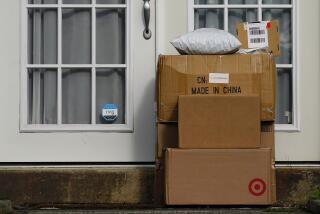Hot Line Can Put Software Pirates in Hot Water : Technology: An industry group established the number as a way of catching those who copy programs illegally.
- Share via
SEATTLE — One call to the Piracy Hot Line is all it takes for the Software Police to come knocking at your computers.
Parametrix Inc. of Seattle found that out last year when the Software Police, also known as the Software Publishers Assn., showed up with a search warrant and a U.S. marshal to audit their computers.
The search turned up dozens of copies of unauthorized software programs and meant a penalty of $350,000 for Parametrix.
The SPA said too many companies “soft-lift”--buy a program and make copies for as many computers as they have.
It’s easy--but it’s just as easy to get caught.
“It only takes one phone call to the 800 number to get the ball rolling. Anyone taking that chance is living on borrowed time,” said Peter Beruk, litigation manager for the Washington-based SPA.
And the stakes just got higher. President Bush recently signed a bill which elevates commercial software piracy from a misdemeanor to a felony. The law imposes prison terms of up to five years and fines of up to $250,000 for anyone convicted of stealing at least 10 copies of a program, or more than $2,500 worth of software.
Those in the computer industry say soft-lifting will be hard to prevent unless programmers are better policed.
AutoDesk Retail Products in Bothell, Wash., has met obstacles in educating its staff on the law. AutoDesk makes computer-assisted drawing programs.
“The problem is that you end up employing people who don’t want to follow convention,” AutoDesk manager John Davison said. “We hire hackers. To them it’s not stealing; they just want to play with the programs. You got a computer, you got a hacker, you got a problem.”
Bootlegging results in an estimated loss of $1.2 billion to U.S. software publishers each year, Beruk said. That’s out of annual sales of $6 billion to $7 billion.
One in five personal computer programs in use today is an illegal copy, according to the SPA’s latest estimates.
SPA was founded in 1984, in part to enforce copyright infringement law for software manufacturers. Since then it has conducted 75 raids and filed 300 lawsuits, Beruk said.
The SPA settled a copyright lawsuit against Olympia, Wash.-based U.S. Intelco for $50,000 in May. Last year the University of Oregon Continuation Center in Eugene, Ore., agreed to pay $130,000 and hold a national conference on copyright law and software use as part of a negotiated settlement with SPA.
The tip-off call about a company running illegal copies of software often comes to SPA’s toll-free Piracy Hot Line from disgruntled employees or ex-employees, Beruk said.
At Parametrix, an investigation backed up the initial report, and SPA got a search warrant, Beruk said.
President Wait Dalrymple said the company now does a quarterly inventory of each computer. Once a year the firm brings in an independent company to check for unauthorized programs.
Soft-lifting, Dalrymple said, can be an easy tangle to get into.
“Our company had had extremely rapid growth, coupled with similar growth in the number of computers we use,” he said. “We had no policy regarding the use of our software and simply didn’t control what was happening.”
Making bootleg copies of software is copyright infringement, and it’s as illegal--and as easy--as copying a tape.
The SPA itself said the problem is more one of education than enforcement.
“Because copying software is so easy, and because license agreements can be confusing, many people don’t realize they’re breaking the law,” the SPA said.






